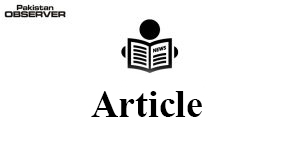Dr Sami Ullah
WITHIN last three quarters of lock down in more than 200 countries, there is mega changes observed in unemployment, output, priorities and decisions regarding the economic management. Throughout the human history on this planet, there were various deadly pandemics with high fatality rate in various parts of the globe but did not lock down the economic activities. COVID-19 was the only situation where all the states unanimously decided to lock down their economic and non-economic activities. This lock down put very devastating and long lasting impact on the services sector, manufacturing and the employee/employer from almost all the segments of the economy. Even the intensity of psychological pressure was very high in the children and old age groups.
Many data generating agencies are threatening that second wave of COVID might be more severe and the numbers of infected people are increasing exponentially. On the other hand, it is observed that the number of positive cases is increasing but more than 80 percent of the cases are without any symptoms of the disease and the detected patients are unable to transmit away. Lastly, the COVID wards are still empty because the virus is adjusted in the human body and can be treated as casual disease like flu and cough. A rushed vaccine at this stage is not in public’s best interest. There is a trade-off between poverty and COVID-19, we have to choose the one for optimization. Majority of the decision makers prioritized to control the pandemic by ignoring the poor but it put very high cost in the shape of poverty, low economic growth, unemployment, trade deficit and economic shocks. If the choice was to protect the economic wellbeing, we can easily manage the virus by economic empowerment of the globe. In the COVID-19 situation, we have chosen the cure which become very costly as compared with the treatment.
The Global Doctors’ Alliance is considered as one of the authentic and reliable forum and they have issued an open letter for the world leaders and governments and explained very briefly that the lockdown decision was not efficient and effective. The globe has to deal with the COVID as a routine treatment and explained that there were 51000 deaths from 2017-18 due to viral diseases in UK, 115000 due to smoking, whereas COVID caused only 42000 deaths. In Pakistan, 6000 deaths were recorded in COVID, whereas, there are 35,000 deaths caused by road accidents every year. The number of deaths due to COVID are lowest in every country as compared with any other disease. This is also to share that if someone has positive COVID test and in next 90 days if that person got dead due to any other cause is considered as COVID death which has enhanced the number of deaths.
The solution of COVID is very simple by enhancing the herd immunity we can easily fight COVID and other diseases. So food is the best and significant solution and can be considered as the best vaccine for COVID, poverty and under development. The Nobel Prize for Peace 2020 is awarded to “World Food Program” because they are focusing for the provision of food for everyone irrespective of age, gender, colour and ethnicity. They have also recommended that food is the best vaccine to fight any socio-economic and medical illness. World Doctors Alliance has also suggested that there is no need of vaccine and we have to focus on herd immunity for long and sustained solution. Pharmaceutical industries are the only beneficiaries in this campaign, rest all are in the economic, psychological and social risk.
Solution of this pandemic is very simple by empowering the immunity and awareness. Developing countries have abundant amount of quality food and environment for building the herd immunity and can supply it to the whole world by facilitating the farmers. There is dire need to prioritize the potential areas for competitive environment and sustained growth of the developing regions. The world leaders should take this opportunity and talk for the efficient and workable solution of this virus otherwise everyone will have to face the music in coming days.
—The writer is Assistant Professor in Economics, University of Gujrat, Pakistan.










